Today marks the opening of the trial against seven land defenders from northern Huehuetenango, all of whom have been held in pretrial detention as political prisoners for over a year. All seven are being accused of crimes that allegedly took place during community protests against the imposition of hydroelectric dams in the region, or protests in response to the arbitrary detentions of other community leaders.
While the accusations are related to three separate incidents, the charges are consistent. All seven are being accused by the public prosecutor’s office of illegal detention and instigation to commit a crime. Some are also specifically being accused of coercion and obstruction of justice.
Hidro Santa Cruz, the Guatemalan subsidiary of the Spanish hydroelectric company Hidralia, S.A., has joined the public prosecutor on the case as a co-plaintiff. The hydroelectric dam being constructed by Hidro Santa Cruz in Barillas, Huehuetenango, has been the focal point of peaceful, organized opposition over the past several years by communities concerned about the impact on the environment and broader social fabric.
The political prisoners argue that they were carrying out their legitimate role as ancestral authorities and leaders of social movements, and were acting as mediators between their communities and state actors. Their arrests and arbitrary detention follows a pattern of criminalization of land defenders throughout Guatemala who are supporting their communities in resisting the imposition of mining, hydroelectric, and other mega development projects.
Those being accused are:
Arturo Pablo Juan, teacher and community leader
Francisco Juan Pedro, businessman and religious leader
Adalberto Villatoro, small business owner and community leader
All from Santa Cruz Barillas. They have been incarcerated since February 26, 2015.
Ermitaño López, businessman and community leader from Santa Cruz Barillas. He has been held in pretrial detention since June 2, 2015.
Rigoberto Juárez Mateo, health technician and ancestral authority
Domingo Baltazar, farmer and community authority
Both from Santa Eulalia. They have been incarcerated since March 24, 2015.
Mynor López from Santa Cruz Barillas is also being tried in this case.
NISGUA provides international human rights accompaniment to the political prisoners and will continue to observe the public trial. For regular updates, follow @NISGUA_Guate on Twitter and regularly check our blog for updates.
The following is a statement issued by civil society organizations in light of the opening of the trial against the community leaders from northern Huehuetenango. Click here to read the original statement in Spanish.
A statement from civil society organizations in light of the opening of the trial against community leaders from northern Huehuetenango
The repressive response to the social issues arising in northern Huehuetenango has led to the criminal prosecution of many community leaders and the prolonged imprisonment of 17 of them, seven of whom remain in detention.
These cases have been carried out in an irregular and arbitrary manner, under the influence of the interests of transnational business projects and their allies in the State. Through reports from national and international human rights organizations and others from within the judicial system, the following irregularities can be seen:
- Arbitrary detentions and lack of due process in accordance with established standards at the national and international level. The United Nations Working Group on Arbitrary Detention recognizes the arrests made on May 2, 2012 in Santa Cruz Barillas and the June 2014 arrests of members of the Peasant Farmer’s Committee – CODECA – as arbitrary detentions.
- Disproportionate use of criminal charges to persecute and accuse community leaders: for example, charges of terrorism and kidnapping with intent to extort (see: the 2012 and 2013 reports from the Office of the United Nations High Commissioner of Human Rights and the 2013 and 2014 reports from the Human Rights Defenders Protection Unit of Guatemala – UDEFEGUA)
- Excessive prolongation of criminal cases (see: International Peace Brigades report, 2013)
- Inappropriate use of arrest warrants that remain effective for years and become reactivated during strategic moments of mobilization and social protest (see: International Peace Brigades report, 2013)
The sentence acquitting Saúl Méndez and Rogelio Velásquez (October 28, 2015) and the sentence acquitting Rubén Herrera (May 30, 2013) issued by Judge Miguel Ángel Gálvez during the intermediary phase exemplify the use of the justice system to persecute and weaken the opposition:
- Sentence acquitting Saúl Méndez and Rogelio Velásquez, issued by the Sentencing Tribunal of Quetzaltenango: “We cannot indulge, nor support a negligent, ineffective and inefficient investigation, which tries to give value to 107 pieces of indirect evidence that don’t prove anything with regard to the crimes in question, such as is the case with the woman…whose testimony is prefabricated and far from the truth of the events…”
With regards to the credibility of the testimonies on the prosecution side, the Tribunal of Quetzaltenango ratifies that: “…These fantastical and manipulated stories are lacking in coherence, logic or clinical credibility, much less judicial credibility, nor establish that the actions [can be] attributed to the accused. It is for this reason that the judges find that there are no crimes in which to charge the accused.”
- The opinion of Judge Miguel Ángel Gálvez Aguilar in the intermediate phase of the second case against Rubén Herrera, May 30, 2013: “The justice officials, namely the National Civil Police, the Public Prosecutor and Judicial System, are making these issues more complicated because we are acting in an irresponsible manner… Arrest warrants are issued for many different charges and in the end only a few charges stick… there is no relation. I think that as judicial officials, we need to act with prudence.
The denial of freedom for Bernardo Ermitaño López Reyes (Don Taño), Sotero Adalberto Villatoro (don Tello), Francisco Juan Pedro (don Chico Palas), Arturo Pablo Juan, Mynor López, Rigoberto Juárez Mateo and Domingo Baltazar, who are recognized as defenders of water, land and territory in northern Huehuetenango, forms part of the criminalization of community political activity. [This criminalization, together with] the repression enacted on the social conflicts in northern Huehuetango and Santa Cruz Barillas, is used to weaken the resistance and paralyze the movements in defense of territory and life.
On July 6, in the lead-up to the opening of the public trial against these seven community leaders, we demand that the judicial system not be used to favor private interests.
We call on citizens, organizations, and communities to accompany this new struggle against impunity and for the building of a judicial system and a State that operates in the interests of the majority.
Guatemala, July 6, 2016
Asociación Feminista La Cuerda
Alianza Política Sector de Mujeres
Voces de Mujeres
Center for Human Rights Legal Action – CALDH

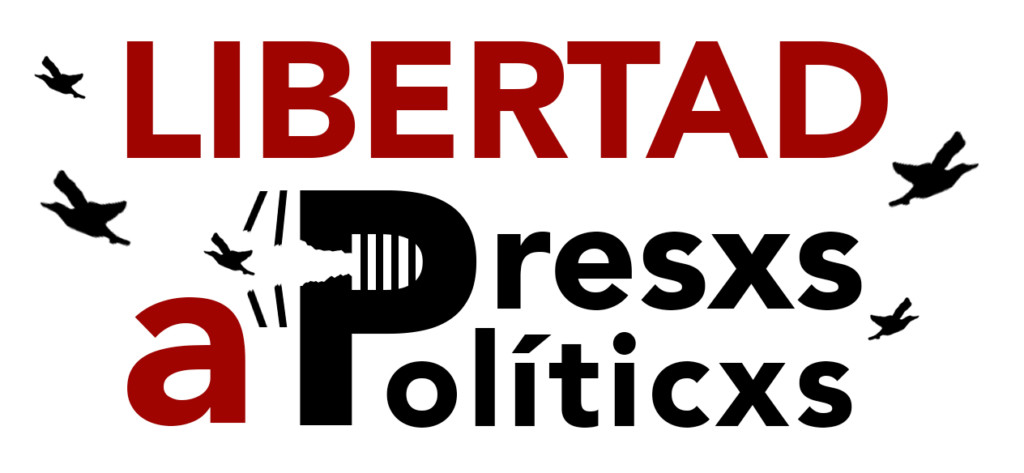

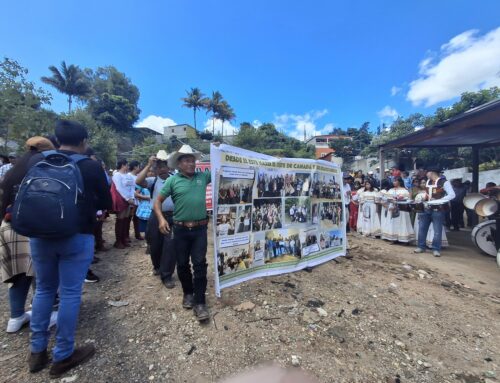
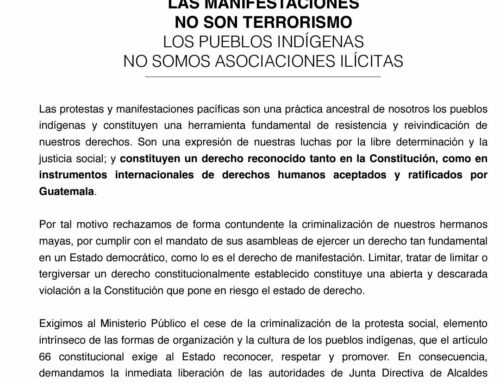
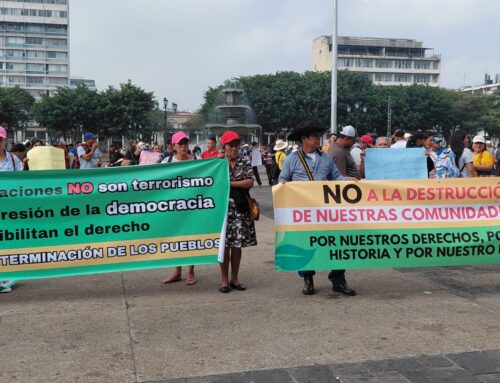
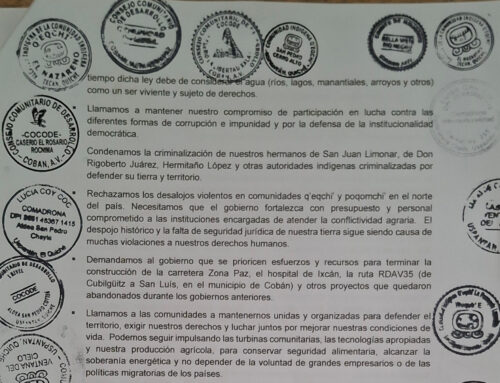
Leave A Comment